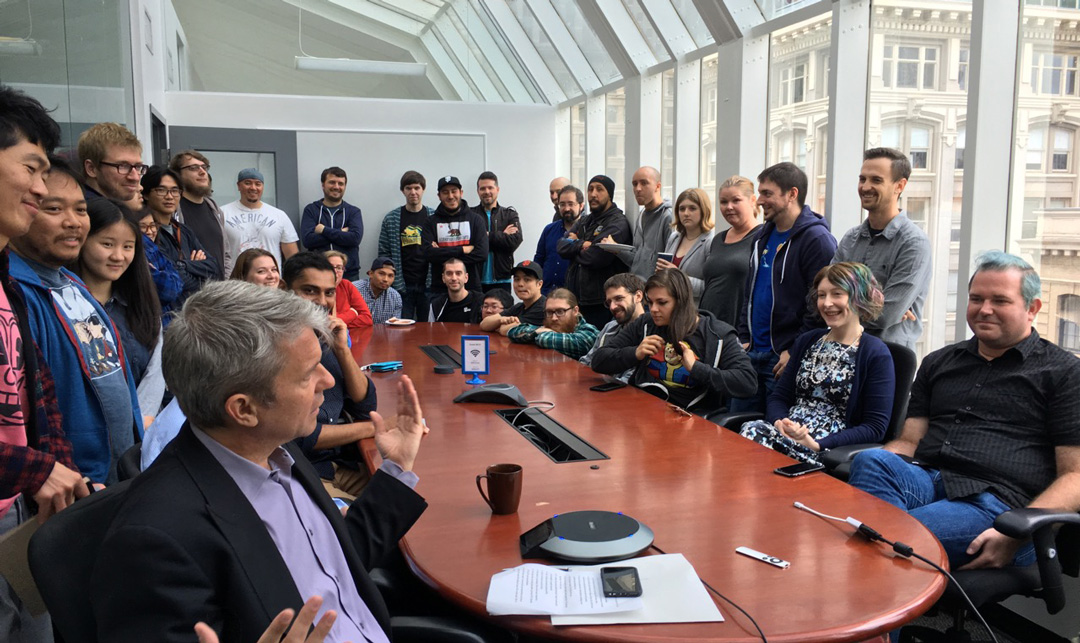Chris DeWolfe didn’t initially set out to be an entrepreneur, but in retrospect, he sees he had behaviors that would lead him in that direction. As a kid he started his own yard work business with his brother; he sold popcorn and peanuts for the Portland Beavers minor-league baseball team; and he took on leadership positions in high school and sports. Eventually he began taking entrepreneurship classes and building business plans at USC. “That’s when I really got the bug,” he says. “My first real company was a marketing company called Response Base–an ad network where we bought and sold media and products. We had about 50 people in the company and sold it within a year and a half.” But what DeWolfe would become known for was his next company: Myspace.
Co-founded in 2003 by DeWolfe and Tom Anderson, Myspace was designed as a digital space for musicians to share music with their fans. It quickly grew into a social media giant, reaching 106 million accounts by 2006. DeWolfe guided Myspace as CEO until 2009, at which point he and Myspace CTO Aber Whitcomb teamed up with former 20th Century Fox executive Josh Yguado to build mobile gaming company SGN (rechristened Jam City in September), which is on track to make $350M in revenue for 2016.
Very few people–Elon Musk, Oprah Winfrey, Mark Cuban, Steve Jobs–can boast of having taken two companies past the $250M mark, but money and notoriety have never been what drives DeWolfe. “What has always motivated me is consumers playing, using, and consuming a product that our company has developed. In the early days when we had 50,000 users on Myspace, I would get so excited when I heard someone mention the name ‘Myspace’; and later on when we had 500,000 users, I could go into a college computer center and every single screen would be Myspace.”

Behind the scenes at Jam City’s Culver City, CA HQ
Photo: Zach Lipp
This love of building and watching a company grow meant that DeWolfe was already thinking about what to do next in 2009 when his time at Myspace was coming to an end. Though not a musician himself, he considered pursuing something in the music realm, which would have been a natural progression. “Myspace had a music label and the largest music catalog ever built and licensed – bigger than Spotify has now,” he says. “In addition to every major music act, we also had every indie in the world.” But, having also just finished negotiating streaming rights between Myspace and the major music companies, DeWolfe was burned out.
“It was an ecosystem where no one was making money and no one could figure out why.”
“The music companies weren’t happy with the deal that we ended up with, we weren’t going to make money on it, and the musicians didn’t know how they were going to make money on it. It was an ecosystem where no one was making money and no one could figure out why.” As he considered what other creative spaces he might explore, games seemed like an open opportunity for innovation, particularly if he could find a way to democratize games and make them accessible to the masses.
In 2006, DeWolfe spent time in Japan working on a joint venture between Myspace and telecom giant SoftBank Group, founded by billionaire Masayoshi Son. The two discussed gaming and how the future lay in mobile at a time before app stores and smartphones were available. Japan was ahead of the curve with 50 percent of social network logins coming from mobile devices. The games available to them were more than just bricks breaking, and it quickly became clear to DeWolfe that accessibility and democratization of game playing would soon be a worldwide phenomenon. It wouldn’t be until 2009 that the connectivity and additional power needed on mobile devices reached the United States, but by then DeWolfe had already entered the gaming industry through his company SGN.
We Make Games
SGN, short for Social Gaming Network, announced its name change to Jam City in September, to more accurately reflect the playful nature of their games. Jam City is also a nod to their top games Cookie Jam and Juice Jam. All of Jam City’s games are currently made and distributed in-house, with the goal of having their games grow in the marketplace for decades as top franchises.
DeWolfe expects their next acquisition will be with a leader in a new genre. “We know what we’re good at–making puzzle games. We’re good at Hollywood storytelling games. When we bought TinyCo and its Family Guy and Marvel Avengers titles, we immediately acquired expertise in a new and very lucrative type of game experience.”
Jam City Co-founder Josh Yguado, whose association with DeWolfe goes back years, calls his partner “an entrepreneur to the core who has been building successful businesses from the ground up his whole life. And together we’re creating a business that’s greater than ourselves. Oh, and we have a pretty good time doing it, too–and that doesn’t hurt.”
Jam City’s corporate culture of teamwork extends beyond the office as well – a value DeWolfe actively encourages. “We have a common objective toward social causes outside of the company. We built a house for Habitat for Humanity. We cleaned up the Ballona Creek together and picked up a ton of trash.” He also brings employees along to Union Rescue Mission in Downtown LA, one of the largest homeless shelters in North America. Though these activities seem like they take away from work, they actually serve to strengthen collaboration. People who may not work together on a daily basis get a chance to interact and build friendships.
“We know what we’re good at … When we bought TinyCo we immediately acquired expertise in a new and very lucrative type of game experience.”
DeWolfe finds it particularly valuable for executives like himself to participate in volunteer activities. “I may work with one of our artists or game designers and we may be painting a wall together and I learn something about them. Then the next time that person has an idea, they’re going to feel free to come to me.” This open-door attitude allows for mentorship opportunities, something DeWolfe sees a need for in LA. “I enjoy mentoring entrepreneurs at the college level, and speaking about social causes.” DeWolfe sees a real need for mentorship in LA, especially as Silicon Beach continues to expand. Engineers and business students in particular benefit from cross-pollenating, and guidance from active professionals like DeWolfe, can be the difference between success and failure.














































